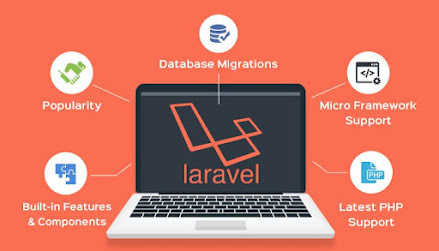Laravel Framework Development
Laravel Framework Development
 |
| Laravel Framework Development |
What is Laravel Framework Development?
Laravel Framework Development refers to the process of using the Laravel PHP framework to build web applications. Laravel is a popular open-source framework known for its elegant syntax, developer-friendly features, and robust ecosystem.
In Laravel Framework Development, developers use Laravel’s features and conventions to streamline the development process, making it faster and more efficient. This includes using Laravel’s built-in functionalities such as routing, database migrations, Eloquent ORM, Blade templating engine, middleware, and authentication to create feature-rich and maintainable web applications. Laravel’s expressive syntax and powerful features make it a preferred choice for developers looking to build modern, scalable web applications. Laravel framework development typically follows the MVC (Model-View-Controller) architectural pattern, which separates the application’s logic , presentation, and data layers, making it easier to manage and maintain the codebase.
Services Offered
Utilizing Eloquent ORM: Laravel’s Eloquent ORM provides a simple and expressive way to interact with your database. Take advantage of Eloquent’s features such as model relationships, query scopes, and eager loading to simplify database operations and improve code readability.
Implementing Middleware for Authentication and Authorization: Middleware in Laravel allows you to filter HTTP requests entering your application. Use middleware to handle authentication and authorization logic, ensuring that only authenticated users have access to certain routes or resources.
Leveraging Blade Templating Engine: Blade is Laravel’s powerful templating engine that makes it easy to create dynamic, reusable views. Learn to use Blade directives, layouts, and components to build well-structured, maintainable front-end code.
Utilizing Laravel Mix for Asset Compilation: Laravel Mix provides a clean, concise API for defining Web pack build steps for your application. Use Mix to compile CSS and JavaScript assets, version files, and leverage features like hot module replacement for efficient front-end development.
Implementing Queueing and Job Processing: Laravel’s queueing system allows you to defer time-consuming tasks like sending emails or processing uploads to improve application responsiveness. Learn to use queues and jobs to handle background tasks efficiently.
Writing Unit and Feature Tests: Testing is an integral part of Laravel Framework Development. Use PHP Unit for writing unit tests to ensure individual components of your application work as expected. Additionally, use Laravel’s testing helpers and methods to write feature tests to simulate user interactions and validate application behavior.
Implementing API Development: Laravel provides robust support for building RESTful APIs. Use Laravel’s API resources, authentication mechanisms, and request validation to create secure, well-documented APIs that can be consumed by other applications or frontend frameworks.
Utilizing Laravel Scheduler: The Laravel scheduler allows you to define scheduled tasks within your application. Use the scheduler to run periodic tasks such as sending email reminders, generating reports, or performing database maintenance.
Conclusion
Mastering Laravel development involves understanding and implementing best practices and techniques to build efficient, maintainable applications. By leveraging features like Eloquent ORM, middleware, Blade templating engine, Laravel Mix, queueing, testing, API development, and the scheduler, you can take your Laravel skills to the next level and build high-quality web applications that meet modern development standards.



Comments
Post a Comment